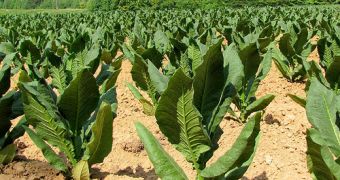Nicotine is bad for you and apparently it has the same poisonous effect on pests, getting scientists' attention for a potential alternative to traditional commercial pesticides.
Tobacco and nicotine make one of the-hardest-to-get-rid-of vices of modern society – smoking, which can lead to lung cancer and early death.
For hundreds of years now, tobacco leaves have been used on a small scale, as a natural organic pesticide, and as the growing concerns about health risk related to tobacco sales are harming tobacco farmers in some parts of the world, scientists looked for a new way of using this plant.
Dr Cedric Briens, Professor of Chemical Engineering at the University of Western Ontario, and Director of the Research and Development, of the Institute for Chemicals and Fuels from Alternative Resources (ICFAR), and colleagues, thought of using tobacco as a natural pesticide, due to its toxic content of nicotine.
They explained that tobacco leaves could be turned into pesticides by a process called pyrolysis, which involves heating up the tobacco leaves at 900 degrees Fahrenheit (482.2 degrees Celsius) in a vacuum.
From pyrolysis results an unrefined substance called bio-oil, which the scientists tested as a pesticide against a wide range of insect pests, including 11 different fungi, 4 bacteria, and the Colorado potato beetle (a major agricultural pest that is very resistant to insecticides).
This oil killed all of the beetles and stopped the growth of two types of bacteria and one type of fungus, and even after the nicotine was removed, the oil kept its pesticide properties.
Because tobacco bio-oil proved to be so effective, and also because it destroyed some but not all of the microorganisms, the team concluded that it could be very valuable as a selective pesticide, far better than those currently used.
It's no wonder that for centuries, gardeners have been using home-made mixtures of tobacco and water as a natural pesticide to kill insect pests.
Of this research could start a 'green' pesticide industry, tobacco farmers would regain an additional income and the world would have a new eco-friendly pest-control agent.
The report was published in ACS' bi-weekly journal Industrial & Engineering Chemistry Research.

 14 DAY TRIAL //
14 DAY TRIAL //